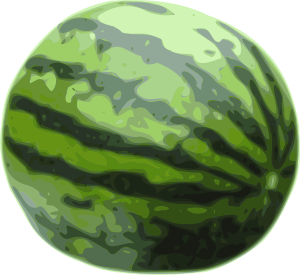Today seems an opportune moment to resuscitate a vital movement for the future not only of Britain, but I would submit, that of the entire world.
I should like to make a humble submission: that when Queen Elizabeth II eventually passes on, we should replace her with a watermelon.
No one can deny that Elizabeth has made a generally excellent job of being Queen, but I can’t help feeling that the peculiar requirements of the role could be equally well fulfilled by a watermelon.
Yes, yes, the baby and all that. But the baby will take years to grow up, and there are no guarantees it will grow up to be as splendid and regal as Great Grandmama. And in the interim we must face King Charles. Whereas the watermelon, I submit, is ready for action without delay.
The argument that aways comes up on these occasions is that because the Queen is apolitical, the entire nation can rally around her in a way the US, say, cannot unite around Barack Obama. This argument, of course, always infuriates Britain’s small republican minority, who point out that they can’t unite around a monarch they don’t want.
The strongest argument in favour of the Queen, though, has always been the elected presidents she prevents us from being forced to endure. President Tony Blair, for instance — though I suspect these days we’d be more likely to end up with President Boris Johnson.
Even if you make a presidency apolitical and purely ceremonial, and strictly exclude politicians from it, you could still end up with President Simon Cowell. Or President Cheryl Cole. Or President Posh Spice. Quite.
This is a forceful argument. Even the prospect of the strange Prince Charles becoming King pales into insignificance beside the image of President Russell Brand.
Ah, but a watermelon could just as easily block the path of all these presidential hopefuls. Essentially, what we are saying we want from a head of state is some one prepared to take part in all the ceremonies and pageants, but refrain from interfering with the government, and generally keep their opinions to themselves, much as Elizabeth II has done. Prince Charles is regarded as a loose cannon because from time to time he expresses an opinion about architecture. This, we feel, is not his role.
Kings and Queens, as far as the British are concerned, should be seen and not heard. What better to fill this role, then, than a watermelon?
The melon, which I should like to humbly suggest we call George, would sit quietly on its throne, consent to be carried upon a royal litter, ride past adoring crowds in a gilded carriage or an armoured Bentley, and never presume to interfere with the workings of elected government.
And he would do all of this a lot more cheaply than the current set-up. Sure, we’d still have to fork out for the big state occasions, and keep the palaces standing, but other than that his only runnings costs would be a decent refrigerator.
Yes, we’d have to change the watermelon from time to time, but we have to do that with the people.
The Royal Family is a valuable tourist attraction that brings a lot of money into the British economy, but I can’t help feeling that our reputation for endearing eccentricity would only be enhanced if we chose a watermelon as our next King, and tourists would still flock to Buckingham Palace eager to catch a glimpse of his noble green skin.
I suspect that the experiment woud prove so popular that other countries would quickly start to emulate it, and France would soon have a watermelon of her own, named Louis.
In short then, I humbly submit that this is the perfect compromise for these times of austerity, that by choosing our next monarch from the melon patch we can retain all the advantages of a hereditary monarchy without ever risking that it falls into the wrong hands, and save a fortune, as we advance into the glorious new age of King George the Watermelon.



An excellent proposal but for one key point; namely that watermelons are not indigenous to Ukistan. I’ll be the first in the queue to welcome a head of state who has originated in Southern Africa but I can’t help but feel that the majority of Ukish will be more than a little resistant to the imposition of an imported fruit which cannot be propagated in the (normal) Ukish climate except in heated glasshouses.
I agree that metaphorically speaking that actually does rather resemble the conditions under which recent heads of state have been propagated but I still feel that local alternatives should be considered first.
Apples may have originated in Kazakhstan but they have prospered and become as much a part of the Ukish way of life as turnips and deep fried mars bars. What is wrong with a good Ukish Bramley, a tart and tangy Russet or a good old Cox’s orange pippin?